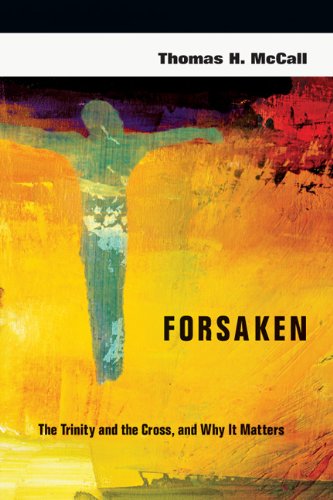Thomas McCall’s Forsaken, reviewed by Timothy Lim Teck Ngern
 Thomas H. McCall, Forsaken: The Trinity and the Cross, and Why It Matters (Grand Rapids: Eerdmans, 2012), 170 pages, ISBN 9780830839582. Thomas McCall writes this book primarily for pastors, students, and a general audience, unlike his previous sophisticated academic study on the Trinity. In Forsaken, the professor of biblical and systematic theology at Trinity Evangelical Divinity School focuses on Jesus’ cry of dereliction and felt abandonment by God the Father on the cross. Typically, we would hear this message in conservative and evangelical-type churches: on the cross, the Son was totally abandoned by God the Father, so that God the Father (in rejecting the Son having borne the weight of our sins on his shoulder and having paid the atonement for our sins as our substitute on the cross) would accept sinners as God’s beloved. Although the Bible seems to say that Christ was indeed abandoned by God the Father, McCall calls this trajectory the pitching of God the Father against God the Son. McCall addresses some of the most thorny questions about the trinitarian faith: a) whether Jesus was ever abandoned by God the Father on the cross, b) what is the relationship between the Father, the Son, and the Spirit, and c) how this trinitarian account (especially Jesus’ death and cry of dereliction) relates to the Christian life?
Thomas H. McCall, Forsaken: The Trinity and the Cross, and Why It Matters (Grand Rapids: Eerdmans, 2012), 170 pages, ISBN 9780830839582. Thomas McCall writes this book primarily for pastors, students, and a general audience, unlike his previous sophisticated academic study on the Trinity. In Forsaken, the professor of biblical and systematic theology at Trinity Evangelical Divinity School focuses on Jesus’ cry of dereliction and felt abandonment by God the Father on the cross. Typically, we would hear this message in conservative and evangelical-type churches: on the cross, the Son was totally abandoned by God the Father, so that God the Father (in rejecting the Son having borne the weight of our sins on his shoulder and having paid the atonement for our sins as our substitute on the cross) would accept sinners as God’s beloved. Although the Bible seems to say that Christ was indeed abandoned by God the Father, McCall calls this trajectory the pitching of God the Father against God the Son. McCall addresses some of the most thorny questions about the trinitarian faith: a) whether Jesus was ever abandoned by God the Father on the cross, b) what is the relationship between the Father, the Son, and the Spirit, and c) how this trinitarian account (especially Jesus’ death and cry of dereliction) relates to the Christian life?
To be sure, Jesus’ cry of dereliction raises some of the most challenging problems for Christians who accepts the authority of the Bible. Simply put, if God the Father did indeed forsake the Son on the cross, then if God is Trinitarian, the Son’s divinity is in question. This is because at that point, the Son loses the intimacy and contact with the other persons of the Trinity, and if so, based on the logic of the inseparability of the Godhead, the Son can no longer be divine when he was forsaken. Furthermore, to hold that the Trinity was rent asunder at Jesus’ cry of being forsaken contradicts an ancient trinitarian formulation that the Trinity operates indivisibly, at every moment, and thus runs the risk of embracing a heretical conception of the Trinity. Consequently, if the Son is not divine, but only merely human, the efficacy of the Son’s promise to save and redeem his disciples is in doubt. More importantly, if God is love (steadfast and not subjected to fluctuation), why did the wrath of God come upon Christ? Was Christ’s death and forsakenness necessary for God to accept sinful humanity? And if so, does that not reveal a God whose love is only passable and whose justice is rather inexact (or laughable, using McCall’s language)? And if Scripture tells us that Jesus must die for our redemption, would we have to recourse to embrace divine determinism—the divine necessity of a predetermined plan of God to accomplish his will and purposes? And if not, was the death of Jesus a meaningless tragedy?
Those interested in the answers to these questions ought to read Forsaken, even if they possess only an elementary understanding of Christology (i.e., the doctrine of the nature, person, and works of Christ). Written in simple, non-technical manner, McCall draws from a range of biblical, historical, and theological materials. And when technical jargon is used (e.g., social trinitarianism, divine impassability, divine simplicity, divine determinism, and primary and secondary concepts of justice), these are plainly explained. Overall, the Evangelical theologian McCall defends the classical view, with some modifications.
Category: In Depth, Spring 2013


